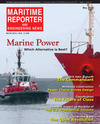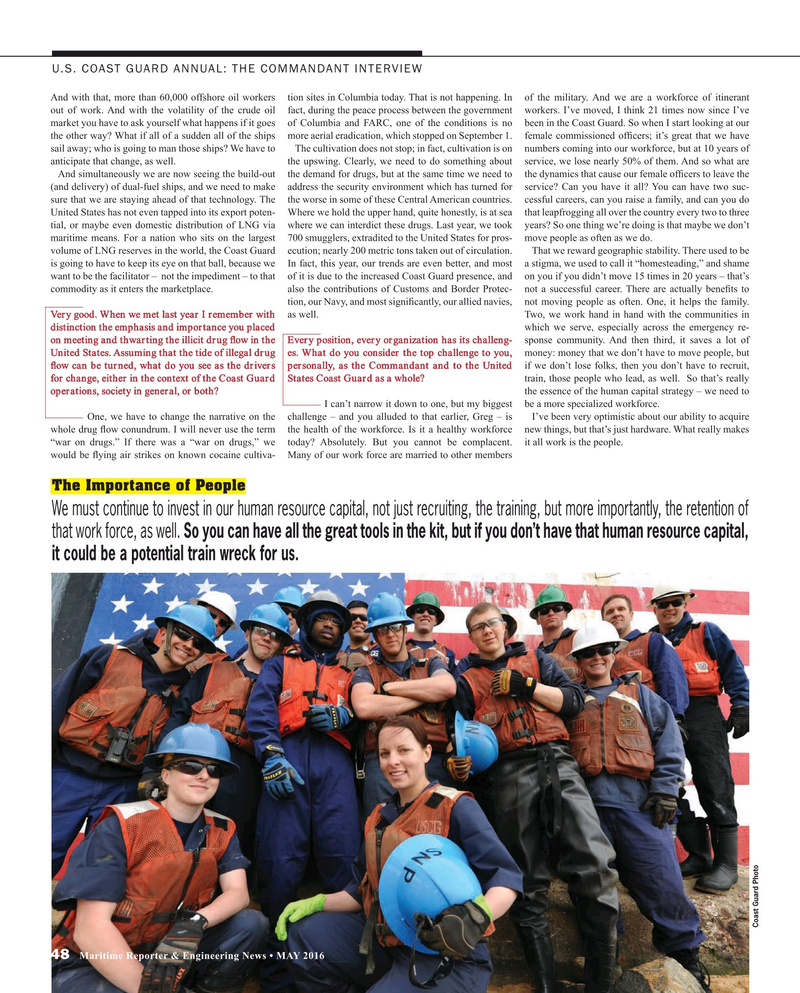
Page 48: of Maritime Reporter Magazine (May 2016)
The Marine Propulsion Edition
Read this page in Pdf, Flash or Html5 edition of May 2016 Maritime Reporter Magazine
U.S. COAST GUARD ANNUAL: THE COMMANDANT INTERVIEW
And with that, more than 60,000 offshore oil workers tion sites in Columbia today. That is not happening. In of the military. And we are a workforce of itinerant out of work. And with the volatility of the crude oil fact, during the peace process between the government workers. I’ve moved, I think 21 times now since I’ve market you have to ask yourself what happens if it goes of Columbia and FARC, one of the conditions is no been in the Coast Guard. So when I start looking at our the other way? What if all of a sudden all of the ships more aerial eradication, which stopped on September 1. female commissioned of? cers; it’s great that we have sail away; who is going to man those ships? We have to The cultivation does not stop; in fact, cultivation is on numbers coming into our workforce, but at 10 years of anticipate that change, as well. the upswing. Clearly, we need to do something about service, we lose nearly 50% of them. And so what are
And simultaneously we are now seeing the build-out the demand for drugs, but at the same time we need to the dynamics that cause our female of? cers to leave the (and delivery) of dual-fuel ships, and we need to make address the security environment which has turned for service? Can you have it all? You can have two suc- sure that we are staying ahead of that technology. The the worse in some of these Central American countries. cessful careers, can you raise a family, and can you do
United States has not even tapped into its export poten- Where we hold the upper hand, quite honestly, is at sea that leapfrogging all over the country every two to three tial, or maybe even domestic distribution of LNG via where we can interdict these drugs. Last year, we took years? So one thing we’re doing is that maybe we don’t maritime means. For a nation who sits on the largest 700 smugglers, extradited to the United States for pros- move people as often as we do.
volume of LNG reserves in the world, the Coast Guard ecution; nearly 200 metric tons taken out of circulation. That we reward geographic stability. There used to be is going to have to keep its eye on that ball, because we In fact, this year, our trends are even better, and most a stigma, we used to call it “homesteading,” and shame want to be the facilitator – not the impediment – to that of it is due to the increased Coast Guard presence, and on you if you didn’t move 15 times in 20 years – that’s commodity as it enters the marketplace. also the contributions of Customs and Border Protec- not a successful career. There are actually bene? ts to tion, our Navy, and most signi? cantly, our allied navies, not moving people as often. One, it helps the family.
Very good. When we met last year I remember with as well. Two, we work hand in hand with the communities in distinction the emphasis and importance you placed which we serve, especially across the emergency re- on meeting and thwarting the illicit drug ? ow in the Every position, every organization has its challeng- sponse community. And then third, it saves a lot of
United States. Assuming that the tide of illegal drug es. What do you consider the top challenge to you, money: money that we don’t have to move people, but ? ow can be turned, what do you see as the drivers personally, as the Commandant and to the United if we don’t lose folks, then you don’t have to recruit, for change, either in the context of the Coast Guard States Coast Guard as a whole? train, those people who lead, as well. So that’s really operations, society in general, or both? the essence of the human capital strategy – we need to I can’t narrow it down to one, but my biggest be a more specialized workforce.
One, we have to change the narrative on the challenge – and you alluded to that earlier, Greg – is I’ve been very optimistic about our ability to acquire whole drug ? ow conundrum. I will never use the term the health of the workforce. Is it a healthy workforce new things, but that’s just hardware. What really makes “war on drugs.” If there was a “war on drugs,” we today? Absolutely. But you cannot be complacent. it all work is the people.
would be ? ying air strikes on known cocaine cultiva- Many of our work force are married to other members
The Importance of People
We must continue to invest in our human resource capital, not just recruiting, the training, but more importantly, the retention of that work force, as well. So you can have all the great tools in the kit, but if you don’t have that human resource capital, it could be a potential train wreck for us.
Coast Guard Photo 48 Maritime Reporter & Engineering News • MAY 2016
MR #5 (42-49).indd 48 5/2/2016 10:33:06 AM

 47
47

 49
49
